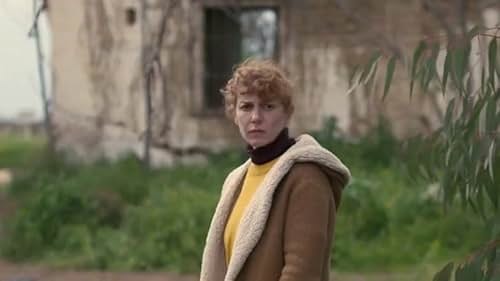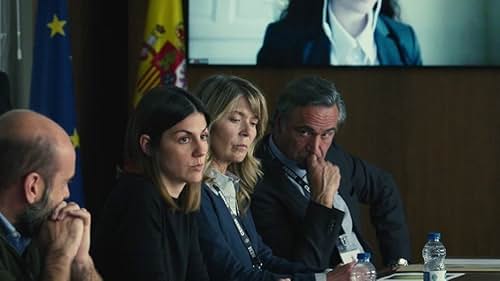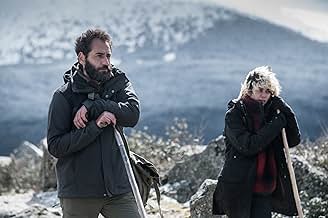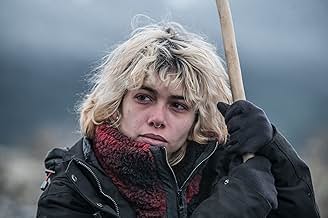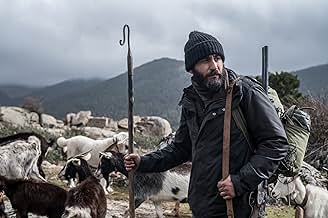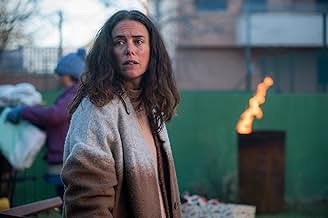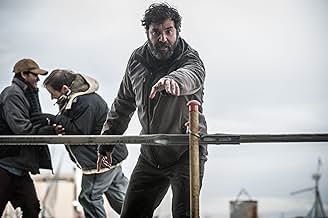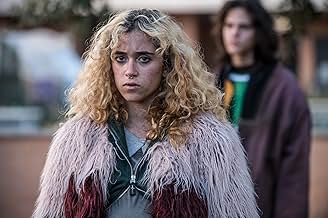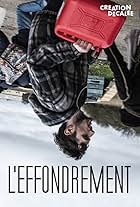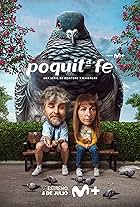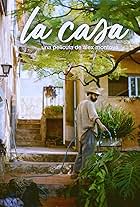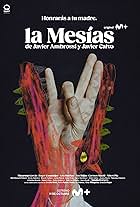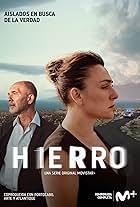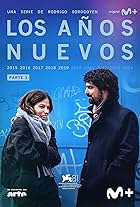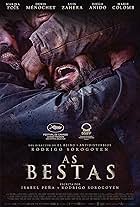Features five stand-alone stories, connected only in that they take place after a solar flair causes a worldwide blackout and deals with the consequences that such a catastrophe might impose... Read allFeatures five stand-alone stories, connected only in that they take place after a solar flair causes a worldwide blackout and deals with the consequences that such a catastrophe might impose.Features five stand-alone stories, connected only in that they take place after a solar flair causes a worldwide blackout and deals with the consequences that such a catastrophe might impose.
- Awards
- 8 wins & 7 nominations
Browse episodes
Storyline
Featured review
Features five stand-alone stories produced by Buendía Estudios and Movistar, in which there is an enjoyable visual style that is already characteristic in the stories these filmmakers carry out . The episodes are connected only in that they take place after a worldwide blackout caused by solar flair and deals with the consequences that such a disaster might impose . The five directors are the following ones : Rodrigo Sorogoyen , Raúl Arévalo, Isa Campo , Alberto Rodriguez , Isaki Lacuesta , being supported by a soundtrack that is sometimes very underhanded by usual collaborator Olivier Arson, winner of the Goya for The Kingdom . And somehow these segments containing main weakness such as depressed and sad events , slowness , unnecessarily dullness and coldness in its staging.
In the first episode , ¨Denial¨ o ¨Negación¨ , is written by Isabel Peña, winner of the Goya for Best Screenplay for El Reino or The Kingdom (Rodrigo Sorogoyen, 2018) and screenwriter of the excellent series Antidisturbios or Riot by Rodrigo Sorogoyen, (2021) , equally produced by Movistar . In this case, the protagonist is Ernesto (Luis Callejo), an official from the General Directorate of Emergencies and Civil Protection who is managing a serious train accident when worrying news arrives about a solar storm that could affect Spain . The overlapping of complications allows the narrative to begin at a midpoint of tension to build progressively, which Sorogoyen/Peña often do with outstanding skillness. The action practically does not come out of the Civil Protection offices, and the meetings in the offices, the quick decisions and the suspense have certain parallels with the political machinery that they described in El Reino, especially when Ernesto tries to convince the Minister (Eva Martín) that he has to take extreme measures to deal with a possible blackout , however , not being confirmed. In this sense, the director and screenwriter play on familiar ground , but the crescendo is developing little by little and to millimetre discursive . Rodrigo has directed a decent first episode , in fact he's an expert filmmaker with experience enough in TV series as Pecera de Eva , Fragiles , Vida Loca , Impares . And he has made notorious , important pictures as 8 Citas , May God Save us , and this El Reino with his fetish actor Antonio De La Torre . Furthermore , a short , Oscar nominated titled Madre , that subsequently Rodrigo became into a long running film : Madre 2019.
In second episode ¨Emergencia¨or ¨Emergency¨ results to be the most boring and tiring segment , being written and directed by Raúl Arévalo. It focus on a hospital weeks after the blackout. The action takes place in the same hospital where the first episode ends, but the passage of time has caused the increasing lack of supplies , so Eva (Ainhoa Santamaría) must make some important decisions. It cannot be avoided to think about the images that could be seen through the news during the coronavirus pandemic, with the collapsed health centers and an evident lack of basic supplies, although there is no direct reference. The script co-written with Fran Araújo and Alberto Marini , and shows social imbalances, although the representation of a better adaptation of the inhabitants of marginal neighborhoods for whom blackouts is a daily reality is too obvious.
In third episode, ¨Showdown¨ or ¨Confrontación¨, about four months have passed after the blackout and uses the contrast of an organized community in a residential neighborhood with high purchasing power whose luxuries are of little use in a society based on survival and often using violent means and while increasing the racist attitudes as well . But the community created by the screenwriter and director Isa Campo, nominated for a Goya for the original screenplay for Maixabel (Icíar Bollaín, 2021), needs to be exclusive in order to maintain its cohesion, which becomes clear when a group of young people without families his appearance, whose rebelliousness and freedom attracts the adolescent Sofía (Zoé Arnao), daughter of Marta (Patricia López Arnaiz) and Raúl (Miquel Fernández). It is an interesting proposal , although predictable in its development, told from a mainly female point of view, about the forms of organization of a community of neighbors who have lost their privileges and the lack of solidarity caused by the need to survive .
En ¨Supervivencia¨ or ¨Survival , turns out the best episode , in which there's action , suspense and a violent final confrontation . Being written by Rafael Cobos and directed by Alberto Rodríguez, great author of La Peste series and films such as Modelo 77 , La isla minima (2015) and El hombre de las mil caras (2016) , for which both won the Goya . The story of the shepherd Cortelazor (Jesús Carroza), shot in the Sierra de Segovia, who tries to protect his herd of goats when a group of people want to take them, also shows the human conflict between those who need to adapt to a new situation and who has been surviving for years. The appearance of the young Diana (Naira Lleó) as an unlikely herding companion also establishes a certain intrigue , although the predisposition of the shepherd to be accompanied by an unknown girl is unlikely.
In the final episode, ¨Equilibrio¨ or ¨Balance¨, Isaki Lacuesta directs a script by Fran Araújo and Isa Campo that returns to the concept of community, but this time with an element of solidarity. The story returns to the day on which the blackout occurred, and takes up the character of Ernesto (Luis Callejo) as a secondary character , relying on the protagonist Alicia (María Vázquez), who tries to recover the orchard that she had left abandoned as a way to tackle a new beginning . The blackout becomes a drastic way to break away from the dissatisfaction of her life before it happened, which sets a hopeful eye on the reboot. Here depicts the coexistence with the immigrants who work in the harvest and exposing the vicissitudes of immigration, but he does so in some sequences that are topical and even puerile in his exposition. There are also some themes present in Isaki Lacuesta's filmography, showing the individuality of his stories , he finds thoughtful moments providing brilliance enough that give the whole a certain solidity such as Between Two Waters (2018), and , his recently presented film : One Year, One Night (2022).
In the first episode , ¨Denial¨ o ¨Negación¨ , is written by Isabel Peña, winner of the Goya for Best Screenplay for El Reino or The Kingdom (Rodrigo Sorogoyen, 2018) and screenwriter of the excellent series Antidisturbios or Riot by Rodrigo Sorogoyen, (2021) , equally produced by Movistar . In this case, the protagonist is Ernesto (Luis Callejo), an official from the General Directorate of Emergencies and Civil Protection who is managing a serious train accident when worrying news arrives about a solar storm that could affect Spain . The overlapping of complications allows the narrative to begin at a midpoint of tension to build progressively, which Sorogoyen/Peña often do with outstanding skillness. The action practically does not come out of the Civil Protection offices, and the meetings in the offices, the quick decisions and the suspense have certain parallels with the political machinery that they described in El Reino, especially when Ernesto tries to convince the Minister (Eva Martín) that he has to take extreme measures to deal with a possible blackout , however , not being confirmed. In this sense, the director and screenwriter play on familiar ground , but the crescendo is developing little by little and to millimetre discursive . Rodrigo has directed a decent first episode , in fact he's an expert filmmaker with experience enough in TV series as Pecera de Eva , Fragiles , Vida Loca , Impares . And he has made notorious , important pictures as 8 Citas , May God Save us , and this El Reino with his fetish actor Antonio De La Torre . Furthermore , a short , Oscar nominated titled Madre , that subsequently Rodrigo became into a long running film : Madre 2019.
In second episode ¨Emergencia¨or ¨Emergency¨ results to be the most boring and tiring segment , being written and directed by Raúl Arévalo. It focus on a hospital weeks after the blackout. The action takes place in the same hospital where the first episode ends, but the passage of time has caused the increasing lack of supplies , so Eva (Ainhoa Santamaría) must make some important decisions. It cannot be avoided to think about the images that could be seen through the news during the coronavirus pandemic, with the collapsed health centers and an evident lack of basic supplies, although there is no direct reference. The script co-written with Fran Araújo and Alberto Marini , and shows social imbalances, although the representation of a better adaptation of the inhabitants of marginal neighborhoods for whom blackouts is a daily reality is too obvious.
In third episode, ¨Showdown¨ or ¨Confrontación¨, about four months have passed after the blackout and uses the contrast of an organized community in a residential neighborhood with high purchasing power whose luxuries are of little use in a society based on survival and often using violent means and while increasing the racist attitudes as well . But the community created by the screenwriter and director Isa Campo, nominated for a Goya for the original screenplay for Maixabel (Icíar Bollaín, 2021), needs to be exclusive in order to maintain its cohesion, which becomes clear when a group of young people without families his appearance, whose rebelliousness and freedom attracts the adolescent Sofía (Zoé Arnao), daughter of Marta (Patricia López Arnaiz) and Raúl (Miquel Fernández). It is an interesting proposal , although predictable in its development, told from a mainly female point of view, about the forms of organization of a community of neighbors who have lost their privileges and the lack of solidarity caused by the need to survive .
En ¨Supervivencia¨ or ¨Survival , turns out the best episode , in which there's action , suspense and a violent final confrontation . Being written by Rafael Cobos and directed by Alberto Rodríguez, great author of La Peste series and films such as Modelo 77 , La isla minima (2015) and El hombre de las mil caras (2016) , for which both won the Goya . The story of the shepherd Cortelazor (Jesús Carroza), shot in the Sierra de Segovia, who tries to protect his herd of goats when a group of people want to take them, also shows the human conflict between those who need to adapt to a new situation and who has been surviving for years. The appearance of the young Diana (Naira Lleó) as an unlikely herding companion also establishes a certain intrigue , although the predisposition of the shepherd to be accompanied by an unknown girl is unlikely.
In the final episode, ¨Equilibrio¨ or ¨Balance¨, Isaki Lacuesta directs a script by Fran Araújo and Isa Campo that returns to the concept of community, but this time with an element of solidarity. The story returns to the day on which the blackout occurred, and takes up the character of Ernesto (Luis Callejo) as a secondary character , relying on the protagonist Alicia (María Vázquez), who tries to recover the orchard that she had left abandoned as a way to tackle a new beginning . The blackout becomes a drastic way to break away from the dissatisfaction of her life before it happened, which sets a hopeful eye on the reboot. Here depicts the coexistence with the immigrants who work in the harvest and exposing the vicissitudes of immigration, but he does so in some sequences that are topical and even puerile in his exposition. There are also some themes present in Isaki Lacuesta's filmography, showing the individuality of his stories , he finds thoughtful moments providing brilliance enough that give the whole a certain solidity such as Between Two Waters (2018), and , his recently presented film : One Year, One Night (2022).
- How many seasons does Apagón have?Powered by Alexa
Details
- Runtime45 minutes
- Color
Contribute to this page
Suggest an edit or add missing content


